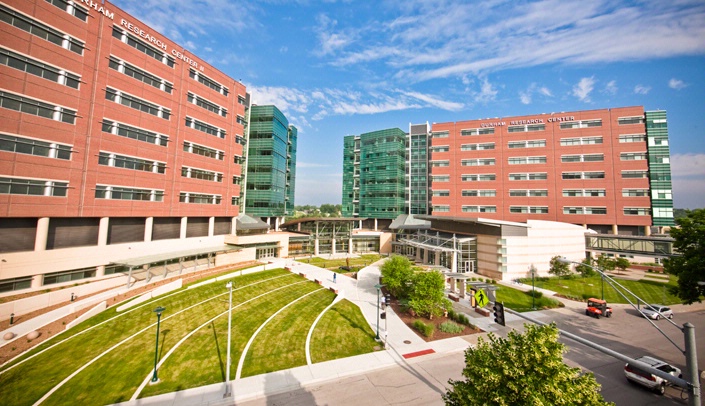Tens of millions of dollars in administrative cuts, continued restraint in hiring and purchasing, and other steps to manage reductions in state funding will hold the University of Nebraska’s spending growth to near zero under a proposed 2018-19 operating budget released today by President Hank Bounds, Ph.D.
FY 2018/19 UNMC Additional Budget Reduction Process Outcomes
The UNMC budget reduction process has impacted a variety of academic, student service and business units across the campus. The impact of the Budget Reduction Team workgroups and the impact of the FY 2017-2019 state budget reductions have been widely shared and discussed at Town Hall Meetings and multiple other venues. The additional 1% cut in state appropriations for FY 2018-19 is $1,550,000 for UNMC, impacting additional academic, student services and business units. View FY 18/19 UNMC additional 1% reductions.
The proposed budget, which will be considered by the Board of Regents at its June 28 meeting, includes $22 million in administrative cuts identified by the university-wide Budget Response Team process that began in early 2017. Dr. Bounds praised Budget Response Team members who have made difficult and in some cases transformational decisions to help the university address three rounds of state funding cuts in the past 14 months.
The BRT cuts, equivalent to an 8 percent tuition increase, have resulted in more than 100 lost jobs across the campuses and consolidations of major areas like information technology, human resources, energy and facilities, and procurement. Yet the teams’ work has helped protect NU’s most important priorities: affordability for students and families and academic excellence.
As the university prepares to submit a 2019-21 budget request to the state later this year, Dr. Bounds expressed deep concern about the impact that additional cuts would have at a time of remarkable momentum and opportunity for Nebraska’s only public university. Even if NU’s state appropriation were held flat, mandatory cost increases like collective bargaining, health insurance and utilities would create a $64 million recurring shortfall by the end of the next biennium.
“The University of Nebraska has taken extraordinary steps to manage our budget challenges while not sacrificing access and quality for our students,” Dr. Bounds said. “But our options going forward are limited. Further funding cuts would require us to have a candid conversation with Nebraskans about what kind of university they want for their children and grandchildren.”
Pointing to NU’s record-high enrollment of almost 53,000, its $3.9 billion annual economic impact and the university’s global leadership in areas like national defense, water and agriculture, and cancer and infectious disease, Dr. Bounds added:
“My hope is that we can work together to find solutions that preserve the partnership between the state and its university that has served Nebraskans so well for almost 150 years. The role of higher education in driving economic growth and changing the trajectory of young peoples’ lives is as crucial as it has ever been.”
Jeffrey P. Gold, M.D., chancellor of the University of Nebraska at Omaha and UNMC, agreed that the focus must remain on the students.
“UNMC and UNO have aggressively sought and implemented strategies to cut our budget while attempting to minimize the impact on our students and the communities we serve,” Dr. Gold said. “These are challenging economic times for the state, and the university is working to be a good partner. It’s important to remember that the university is not only a critical economic driver for the state, but an institution of higher learning. No university ever cut its way to greatness, and we must remain student-focused and highly mission-driven as we keep our eye on the future.”
Given the university’s limited options for managing further cuts, the budget proposal authorizes Dr. Bounds to implement a tuition increase in the spring 2019 semester if university appropriations are withheld during 2018-19. State appropriation allotments were withheld by 2 percent in both 2016-17 and 2017-18.
The long runway for implementing university budget cuts — closing programs, for example, can take years in order to allow students to finish their degrees — has required the use of cash to meet operational needs in the past few years. A midyear tuition increase on top of the 3.2 percent increase previously approved by the board would be an unpleasant but necessary step if the university’s 2018-19 appropriation is reduced further, Dr. Bounds said.
The university will continue its historical practice of increasing need-based financial aid at the same rate as tuition. Dr. Bounds noted that even with the planned tuition increase — amounting to $6.25 to $7.50 more per credit hour for most resident undergraduates — costs across the NU campuses continue to be well below the peer averages.
The proposed budget also includes a 1.75 percent increase in the salary pool for non-bargained employees, to be distributed on the basis of merit.
The University of Nebraska receives about $570 million in state appropriations. State funding and tuition are the primary sources of revenue for the university’s day-to-day operations.
The board will also consider the proposed 2018-19 operating budget for the Nebraska College of Technical Agriculture at its June meeting.
